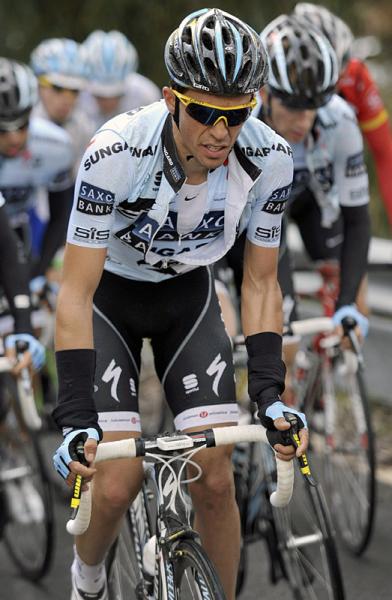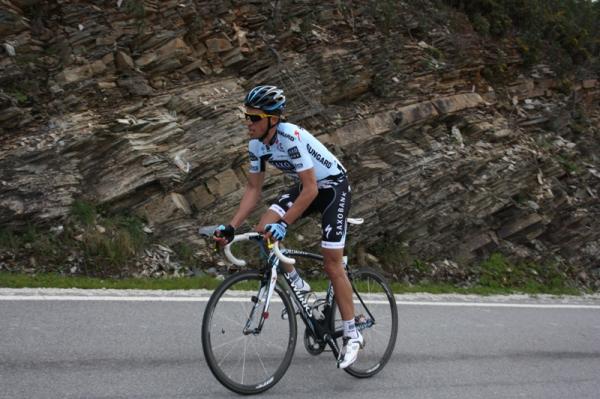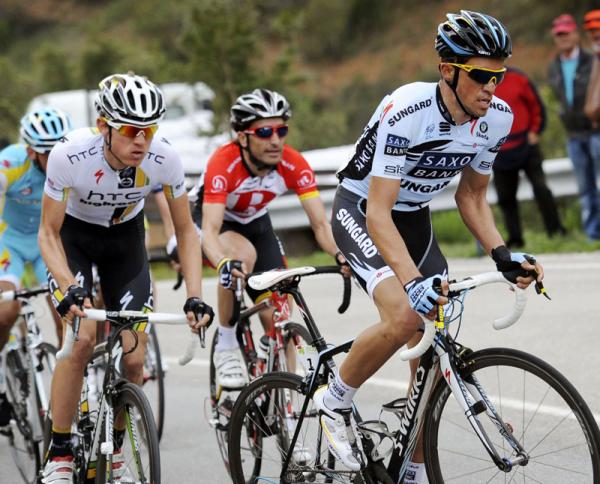Contador calls on UCI and WADA to believe in their anti-doping system
Controversial Spaniard trumpets defence dossier



Alberto Contador (Saxo Bank-SunGard) has challenged the UCI and WADA to “show that they believe” in their anti-doping system. The Spaniard tested positive for Clenbuterol at the 2010 Tour de France but was cleared to race by his national federation (RFEC) last month. It is thought that the UCI and WADA will look to appeal the matter to the Court of Arbitration for Sport.
Contador admitted that he didn’t know what action the two bodies would take regarding the RFEC’s hugely contentious decision to absolve him, but he claimed that his 600-page defence dossier and his biological passport data are sufficient evidence of his good faith.
“I would just like that they read the whole dossier without preconceptions and without yielding to external pressures,” Contador told Gazzetta dello Sport. “Between the biological passport and anti-doping controls they have hundreds of pieces of data collected from years of my career. I believe in the system and they too should show that they believe in it.”
Contador’s defence is built around the claim that the traces of Clenbuterol in his urine are ascribable to having consumed contaminated meat before the test, which was taken on the Tour’s second rest day on July 21. The meat in question is alleged to have been brought from Spain.
“The life of a cyclist, especially in stage races, is made up of routine,” Contador said. “The only thing that I had changed from the usual was that [eating the Spanish meat]. A friend of mine had brought the fillet from Spain for us to have a small celebration together.”
Position of privilege?
The drawn-out nature of the case has seen Contador run up significant legal costs and he acknowledged that not all athletes could afford to go to the same lengths to defend themselves. However, he claimed that his case will have repercussions for others.
The latest race content, interviews, features, reviews and expert buying guides, direct to your inbox!
“I haven’t calculated [the cost], but it’s very high, truly a sea of money,” Contador admitted to Gazzetta dello Sport. “However, I’ve never asked for adjusted expert opinion that was favourable to me. I’ve asked for the truth of science.
“It’s a justice that few would have been able to allow themselves. But my battle is also for those who have fewer possibilities than me.”
Contador rejected criticism from Tom Boonen (Quick Step), who said that he believed other riders in the Spaniard’s position would have been punished.
“He doesn’t have a fair view,” Contador said. “He should think that thanks to my work, my sacrifices and my money, unjust rules will come to be modified. And perhaps he too will one day benefit. Because if that weren’t the case, I bet that what has happened to me would happen to others.”
Another aspect of the Contador case that has drawn international condemnation has been the supposed influence of Spanish political figures, most notably the words of support of Prime Minister José Luis Rodríguez Zapatero. Contador was at pains to point out that the disciplinary process was impartial.
“I was very surprised by his intervention,” Contador said. “I don’t know if it helped me. The committee that absolved me is absolutely independent.”
Difficult moments
When news of Contador’s positive test first broke, the 28-year-old speculated that he would leave the sport if he was found guilty of an infraction, and he reiterated that his most difficult period came in the weeks immediately after the announcement.
“I went through some very difficult moments,” he said. “Perhaps not everybody who had their say about me realises that I’m not a robot but a person. Malicious and stupid things were spread against me in the media.”
While Contador has returned to competition as normal at the Tour of the Algarve, and has recently been working on his time trial position with new manager Bjarne Riis, he said that the experience has changed him.
“I’d like to be the same as before, but I think it would be impossible,” he said. “I’ve suffered a lot. Now I’m more closed and reserved, and maybe a little less altruistic. It helps to have little bit of armour.”
Nonetheless, Contador continues to enjoy widespread support in Spain, and in his hometown of Pinto in particular. “From my people, I have never had a disrespectful word or gesture,” he said. “However, seeing my mother and father cry has been hard.”
Racing through the storm
For now, Contador is back in the peloton, pending a possible appeal from WADA and the UCI, and the Giro d’Italia is currently in his crosshairs. His will ride the Tours of Murcia, Catalunya and Castilla y Leon and possibly Flèche Wallone before tackling the Italian race.
“The Giro is my first big objective of the season,” he said. “Last week I saw the stages on the internet. It’s really hard, incredibly hard. There isn’t one queen stage, there are six of them.”
It seems unlikely, however, that the intricacies of his case will allow Contador to focus solely on racing in the weeks and months ahead, and he was a little more circumspect when Gazzetta dello Sport asked him about his chances of lining up at the Tour de France.
“It’s in my plans,” he said. “If I can, I will ride it.”

Barry Ryan was Head of Features at Cyclingnews. He has covered professional cycling since 2010, reporting from the Tour de France, Giro d’Italia and events from Argentina to Japan. His writing has appeared in The Independent, Procycling and Cycling Plus. He is the author of The Ascent: Sean Kelly, Stephen Roche and the Rise of Irish Cycling’s Golden Generation, published by Gill Books.